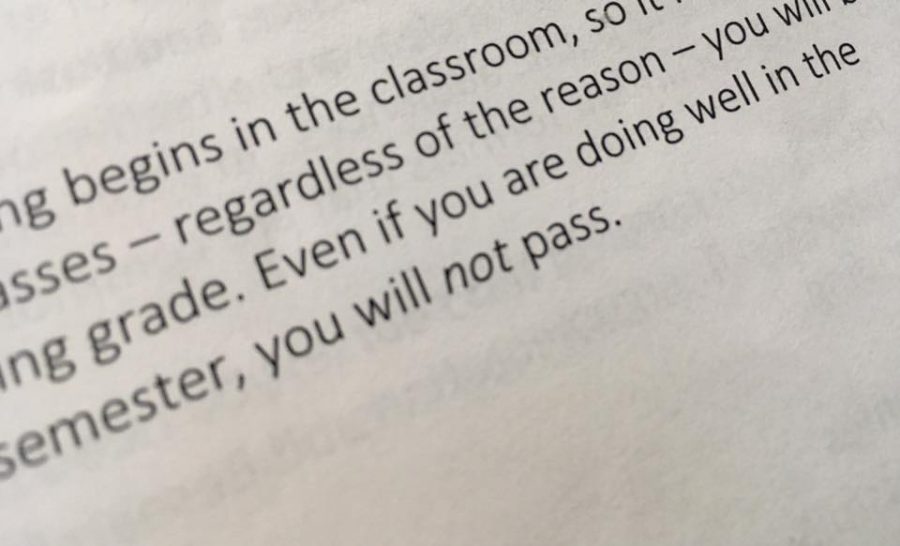The pitfall of attendance policies
March 10, 2017
Attendance in class is an extremely important part of college education. It’s a simple concept to understand—you show up to class, you take notes, you learn, you pass. It should be no mystery to any student that good attendance is essential in order to succeed in class.
That being said, it is quite arguable that some class attendance policies at Lakeland University take these facts and turn them into additional obstacles to be overcome by students.
Lakeland has no attendance policy for instructors to adhere to, causing some professors to take their policies to the extreme.
Take for example, this direct quote from one Lakeland University class syllabus regarding class attendance: “If you miss more than four classes—regardless of the reason—you will be asked to withdraw from the course or given a failing grade.”
The policy breaks out the Gandalf stick further with “even if you are doing well in the course and your fifth absence occurs late in the semester, you will not pass.”
In other words, a parent-student who may be forced to miss class in order to tend to his or her sick children during a winter semester, but yet puts in the extra effort out of class to stay on track with the lectures and assignments, and keeps a solid grade, will still be rewarded with a failure in the course from a syllabus technicality.
Some attendance policies offer other conditions, though with little varying leeway.
Another class syllabus adds extra verbiage to an otherwise identical policy: “Absences will be excused for the following: hospitalization for other than elective surgery, a death in the family and participation in an approved extra-curricular activity.”
In other words, students must hope that their extra-curricular activities meet the satisfaction of their instructors to not receive a recordable absence. They also, according to interpretation of the syllabus, might need to divulge the details of a surgery to their instructors for approval. This begs the question, what gives instructors the right?
Public universities have historically given students personal management in their attendance to class.
UW-Milwaukee’s Psych 101 syllabus does not acknowledge an attendance policy at all, citing only important exam dates that ought not to be missed should the student not wish to receive a 0 percent on the exam.
Even so, the syllabus does offer the chance for make-up exams with written documentation, such as a doctor’s note, with no indication that the medical details be divulged for validity.
A sampling of the syllabi from the political science department reveals almost no attendance policies whatsoever in lieu of a focus on quiz and exam dates. One lone syllabus gives attendance a 5 percent weight on a student’s overall grade, with attendance being randomly conducted throughout the semester.
This is a typical trend amongst larger, lecture-hall centered public universities. Conversely, however, UW-Sheboygan, with its smaller class sizes, has adopted attendance policies with point systems.
With point systems, a student may be docked or lose bits and pieces of percentage points, but they will not overall fail a course for lack of attendance if their work and assignment submissions show that they are still working and absorbing the material.
So why the crack of the ruler from Lakeland University’s professors? While there are varying attendance policies on campus, the majority of them contain common pitfalls that will fail students for missing “too many” classes, some without any opacity whatsoever, while some at instructor discretion.
If the design of the University is to teach students as adults, isn’t the courtesy of being treated and respected as decision-making adults to be expected in return?
After all, students pay the bills, and ultimately isn’t it up to them how they wish to spend their time and money, whether it be missing a class for frivolous activity or missing a class due to having to take an extra shift to pay for college in the first place?
If a student either can or has to miss class, isn’t it their prerogative to sink or swim on their own academic merit and work ethic without the threat of expulsion from a course? All professional jobs have sick days and paid vacation, and those jobs pay the employee, not vice versa.
There are unreasonable consequences for matters that could very often be very well out of the hands of those facing them. As the old saying goes, shouldn’t the punishment fit the crime?
Failing students who are able to functionally balance several dishes of life and succeed due to work ethic and willpower seems a bit overkill.
Perhaps Lakeland University’s instructors can implement aspects of public university methods while still maintaining a high emphasis on the needs and benefits of class attendance.
College is a major part of life, but it is still just a part. Life will happen, and attendance policies ought to be just a bit more accommodating than condemning.



Travis Hi • May 6, 2017 at 10:11 pm
Beautifully put.